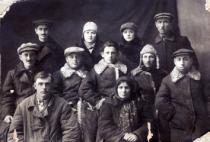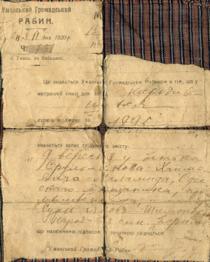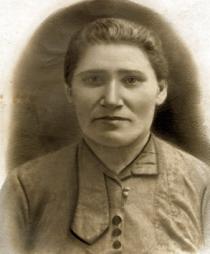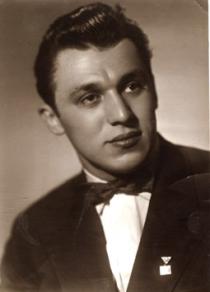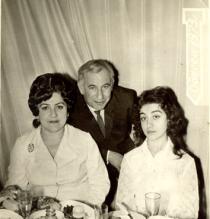This is me Faina Melamed, my husband Efim Shpielberg and our daughter Mila. This photo was taken in Odessa in 1973.
In 1954 I and my mother sold everything we could and moved from Samarcand to Odessa. Later my brother Boris came to Odessa. He had many friends and acquaintances and one of them, helped me to obtain a permanent residential permit in Odessa. My brother's friends also helped me to get a job of secretary at food storage.
In 1957 a bunch of young people came to a party at my friend Raya's place on the October Revolution Day. Boys contributed five rubles each for the party and girls 3 rubles. They told me to make meat. My mother bought beef sirloin and I fried it nicely. I wasn't quite eager to go to this party. I had no interest in any of the young people to be there. I dressed up and put on a small apron to kind of serve at the table. I was just going to kill time. Then I got an invitation from Efim Shpielberg. He was a handsome boy. I danced with him and he convinced me to take off my apron and enjoy the party like everybody else did. By the end of the party he declared to me 'You will be my wife'. I advised him to test his feelings. After this party he invited me to his aunt Polia's birthday. I got confused and asked him 'What if your mother doesn't like me?' and he replied 'It's all done! It doesn't matter whether she likes you or not! I've made a decision!'
Efim was born to a religious Jewish family in Odessa in 1929. His father Israel Shpielberg was born near Odessa in 1898. He cut fabrics. He perished at the front near Rostov in 1943. His mother Maria Shpielberg was born in Odessa in 1902, in Moldavanka [a poor Jewish neighborhood on the outskirts of Odessa]. She was a dressmaker. During the Great Patriotic War he got lost during evacuation in Novorossiysk. He was 12 years old. Our soldiers in an artillery battery gave him shelter and he stayed with them. In 1943 he found his mother and sisters in Nukha town, Azerbaijan. After the war they returned to Odessa. Efim finished a military railroad school in Odessa. In 1950 he went to serve in the army. After he returned he changed many jobs before he went to work as foreman of a construction crew at Vorovski factory.
We got married two years after we met. In 1959 we had a civil ceremony in a registry office. My mother cooked something and we ground some coffee. I invited my Russian neighbor Nadia. She was my friend. Efim's mother and my distant relative also came to the wedding. My sister Esfir was away from Odessa at this time. In general, we had a small wedding party. I didn't have a wedding gown. Life was hard after the war. After we got married we lived in my home in 108, Ostrovidova Street. Although we lived in the basement we kept our rooms ideally clean. My mother did all housekeeping. In 1960 my daughter Mila was born.
In 1966 I received a two-bedroom apartment with all comforts in a 5-storied building in Primorskiy district in Odessa. We were so happy about it. Mila went to the kindergarten. In 1968 she went to school # 56. Mila wanted to study music and we bought her a piano. She went to music school with her friends. I was very happy that children liked her: it meant she was growing to be an honest and decent person. She was chairman of the council of her pioneer unit in class and then she became secretary of the school Komsomol unit. She invited her classmates to birthdays or other holidays at home. I grumbled about it: I had a lot of cooking and cleaning to do. My husband always calmed me down in such situations. When children came to our home I always tried to make them sufficient food and make them feel at ease.
My husband earned well and we traveled a lot. We went on cruises on the Black Sea several times. We visited Sochi, Yalta, Novorossiysk, Batumi and Sukhumi, the Baltic Republics. They were fascinating, but expensive trips. I liked going to Moscow and Leningrad. In 1976 my husband and I took a 2-month trip to Uzbekistan. We visited Tashkent, Buchara and Samarkand, the town of my youth. I felt like being young again; I breathed in the air of my childhood: pise-walled huts, meandering streets and rich bazaars in Samarkand with plenty of fruit, greeneries, heaps of dried apricots and melons.


